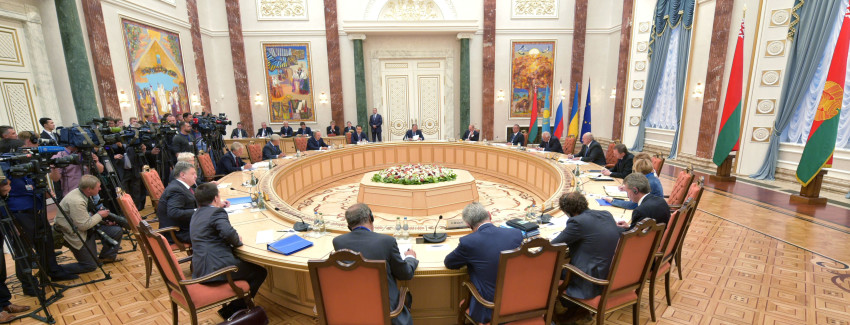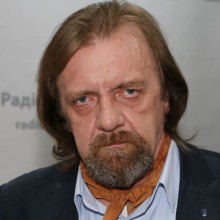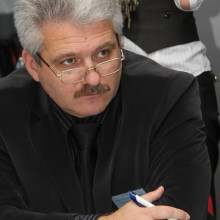Oleh Belokolos
director of international bilateral relations
of the Maidan of Foreign Affairs Foundation
Even a cursory content analysis of the Ukrainian media reports say that the most mentioned word in Ukraine’s information space this year was "Minsk" - both in the context of the "Minsk process" and the implementation of the so-called "Minsk agreements."
But as we see, quantity has not turned into quality. In contrast, it is only the number of militant attacks and the death toll that increased, as well as the scale of destruction, and the people’s despair and pessimism. According to the polls conducted by Socis in March of this year, almost two-thirds of respondents believed that it was Ukraine which had lost as a result of signing off the Minsk deal.
It is obvious that it’s the Kremlin which benefits from the atmosphere of constant uncertainty. Therefore, Moscow keeps injecting various elements of instability in the Ukrainian society and at the same time puts pressure on the Normandy Four to have its demands satisfied.
Realizing that the process is almost in a "deadlock", its participants this fall tried to give it a new impetus. As reported, during the latest meeting in a Normandy format in Berlin October 19, it was decided to draft a "roadmap" of the implementation of Minsk accords. Meanwhile, a meeting of foreign ministers of Ukraine, Germany, France, and Russia in Minsk November 29 saw no result. In particular, there was no agreement reached on the contents of this "road map."
However, today we are continuously convinced that the implementation of Minsk agreements plays in favor of Ukraine both in terms of the need to use all diplomatic tools and the alleged prevention of a full-scale Russian aggression.
Unfortunately, it is not the case. The truth is that the "Minsk Path" will never bring us to Crimea, and the Crimean issue will be put into a foreign political back shelf. Very indicative in this context were Russia’s explicit threats to Ukraine as a response to our missile drills December 1.
We should also not be delusional and we should be aware that any agreement with Russia does not rule out Moscow’s new claims ranging from completely absurd to openly arrogant. After all, the Kremlin’s main goal is to return Kyiv to the orbit of Russian influence and to prevent Ukraine's rapprochement with NATO and the European Union. Moscow seeks to impose on Kyiv a limited sovereignty, which is totally unacceptable for the Ukrainian society because resisting such trends was a major cause of the Revolution of Dignity.
Even if we hypothetically assume at least a partial implementation of the Minsk agreements, Ukraine will clearly lose strategically: the prospects of becoming a European "disabled state" and a chronic recipient of international aid are almost inevitable. And it's not even about the elections, but rather in the fact that Russia wants to inject into a weak, although more or less united Ukrainian organism a dangerous and possibly deadly virus of the "Russian world".
Is this the future the Ukrainians want for their country?
The Ukrainian leadership sees no other way out of the situation than the Minsk agreements. At the same time, Kyiv insists on maintaining international sanctions against Russia. Meanwhile the EU today is beginning to discuss the alternatives. In particular, Europe is considering the so-called "step-by-step" lifting of sanctions against Russia in exchange for the implementation of specific provisions of Minsk. It is possible also that Washington's position on the Minsk agreements next year, as well as that of Paris, will most likely not coincide with the stance of Berlin. That is, it is highly possible that the "Normandy format" in its current shape will cease to exist as such.
So, what does the official Kyiv hope for? If any "Plan B" exists, the extremely concerned public knows nothing about it. The sense of numerous statements remains unclear about changing the Normandy Four to some other format (for example, the so-called Geneva Plus, of which we have not heard anything new for a while). The thing is that a prerequisite for any change must be an appropriate consensus that today is obviously missing today.
Also, it is no secret that a deliberate implementation in the occupied areas of Donbas of an anti-Ukrainian quasi-state project was launched two years ago, which is now in full swing – the Kremlin plans to legitimize the so-called "special status of Donbas" in the area with the destroyed economy and prevailing poverty, and where the only influence is that of Moscow and the elite of the former Party of Regions. By the way, the latter is planning to use this resource to return to power throughout the whole of Ukraine.
We finally need to give a frank answer to a difficult question: what is more important to us – the people or the territory? Perhaps today it is the people. Why? That’s because the State is all about the people. No state can and does exist without its people. Particularly, without those who in March-April of 2014 took to the streets of Donetsk with the national flags and obviously hoped for some help from Kyiv, while being severely beaten by the aggressive supporters of Russia, gone mad due to the overall impunity.
It is these patriots whom we have to take care of today.
Source: UNIAN













